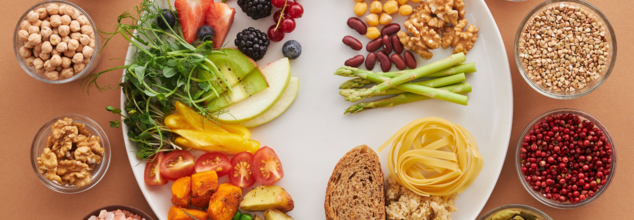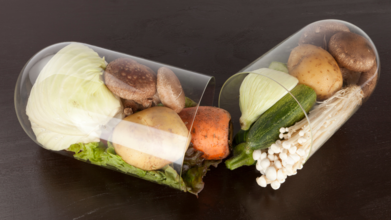- Health Conditions A-Z
- Health & Wellness
- Nutrition
- Fitness
- Health News
- Ayurveda
- Videos
- Medicine A-Z
- Parenting
- Web Stories
7 Must Have Superfoods To Up Your Immunity Game

Credits: Canva
As the monsoon season is about to end, it brings a refreshing change to the environment but also increases the risk of infections and weakened immunity. This transitional period is when most viruses happen. To stay healthy during this time, it’s essential to boost your body’s defenses with the right nutrition.
Incorporating foods that are rich in nutrients, vitamins, and minerals can play a crucial role in enhancing your immune system. Let’s explore why foods like sattu, corn, potato, dates, ragi, jackfruit seeds, and pulses are perfect for monsoon immunity.
Sattu: The Energy-Boosting Superfood
Sattu, made from roasted gram flour, is a rich source of protein, fibre, and essential nutrients like iron and magnesium. It helps in maintaining energy levels and prevents lethargy, which is common during the monsoon. The high fibre content also aids digestion and keeps your gut healthy, which is key to a strong immune system. Additionally, sattu is easy to digest, making it a perfect ingredient for light yet filling meals.
Corn: High in Antioxidants and Fibre
Corn, a monsoon staple, is rich in fibre and antioxidants like vitamin C and carotenoids. These antioxidants help in fighting free radicals, protect the body from infections, and boosting overall immunity. Corn is also great for digestion and keeps your stomach light while providing a steady source of energy. Roasted or boiled corn makes for a delicious and nutritious snack that can help you stay fit during the rainy season.
Potatoes: A Comfort Food with Immunity-Boosting Properties
Potatoes, often seen as a comfort food, are an excellent source of vitamin C, potassium, and fibre. Vitamin C is crucial for a healthy immune system, especially during the monsoon when the body is more prone to infections. Potatoes also support gut health and keep you feeling full for longer, making them a perfect ingredient for wholesome meals that support immunity.
Dates: Rich in Iron and Natural Sugars
Dates are a powerhouse of energy, iron, and natural sugars, making them a great snack to combat monsoon fatigue. They are also rich in antioxidants, which help in fighting infections and improving overall immunity. The high fibre content of dates aids in digestion, while their iron content helps in maintaining healthy haemoglobin levels, essential for a strong immune response.
Ragi: The Calcium-Rich Grain
Ragi, or finger millet, is known for its high calcium and iron content, both of which are essential for strong bones and overall immunity. Ragi is also rich in antioxidants and amino acids, which help in detoxifying the body and keeping infections at bay. During the monsoon, when viral infections are common, consuming ragi can help fortify the immune system and provide sustained energy throughout the day.
Jackfruit Seeds: A Nutrient-Dense Addition
Often discarded, jackfruit seeds are actually rich in proteins, vitamins, and antioxidants. They help in boosting immunity by fighting off harmful bacteria and viruses that thrive in humid weather. The seeds also promote good digestion and are a great source of dietary fibre, which is vital for gut health—a key factor in maintaining strong immunity during the monsoon.
Pulses: Protein-Packed and Immunity-Enhancing
Pulses, including lentils, beans, and chickpeas, are excellent sources of plant-based protein, iron, and fibre. Protein is essential for repairing tissues and producing antibodies that fight infections. Pulses also contain essential vitamins like B-complex, which support metabolism and overall health. Including a variety of pulses in your monsoon diet can ensure you get the nutrients necessary for a well-functioning immune system.
Wednesday's Jenna Ortega Eats Kiwi With The Skin On - Is That Healthy, Doctor Weighs In

(Credit-Jennaortega/Instagram)
Jenna Ortega, known for playing the beloved Addams Family character Wednesday, recently posed a video exclaiming how she ‘recently’ found out you can eat kiwis with its skin on, which has sparked a great deal of conversation about whether it is healthy or not.
We are all used to either cutting out the fuzzy skin of kiwis or cutting it in half and scooping out the soft fruit flesh from the inside. However sometimes, just because we are used to something, doesn’t mean it is right. For a long time, peeling fruits was a norm and people thought it was necessary to do, to be safe. However, recently we have seen more scientific proof of why these fruit peels is not only edible but have hidden benefits.
Weighing in on this conversation gastroenterologist Dr. Joseph Salhab and registered dietitian Gillian Culbertson posted a video explaining how this is actually a good practice.
Can You Eat Kiwi With Skin On?
Eating the kiwi skin can significantly boost the fruit's nutritional power. Dr Salhab and Culbertson explain that the skin is loaded with
More Fiber
Eating the skin increases the kiwi's fiber content by up to 50%. This is great for your digestive system, helping to prevent constipation and support a healthy gut.
More Vitamins
You'll get more vitamin C and vitamin E, which support liver health and your immune system. The skin also adds extra folate, magnesium, and vitamin B6.
Rich in Antioxidants
The skin contains three times more antioxidants than the fruit itself. These include polyphenols and vitamin C that fight inflammation and help protect your cells from damage.
What Are The Benefits of Kiwi Skin?
According to the Cleveland Clinic, eating kiwi, especially with the skin on, offers other notable health perks:
- Eating a kiwi two hours before bed can help your body produce melatonin, a hormone that regulates sleep, leading to a better night's rest.
- The fiber and antioxidants help protect the colon from DNA damage, which can lower your risk of colon cancer.
What Are the Risks of Having Kiwi Skin?
While kiwi skin is packed with nutrients, it's not for everyone. If you have a history of kidney stones, you should avoid eating the skin. The skin contains high levels of oxalates, which are natural substances that can bind with calcium in your body. This can lead to the formation of crystals in your kidneys, increasing your risk of developing painful kidney stones. It's much safer for you to simply enjoy the fruit on its own and throw away the skin. If you're ever in doubt, it's always best to check with your doctor first.
Tips for Eating Kiwi Skin
If the idea of eating a kiwi with its fuzzy skin doesn't appeal to you, don't worry—you have options.
Try a Golden Kiwi
The golden kiwi has a smooth, fuzz-free skin that's much easier to eat than its green counterpart.
Scrub the Fuzz Off
For green kiwis, you can gently scrub the skin with a kitchen towel or vegetable brush while rinsing it under water. This will help remove the fuzzy texture and make it more pleasant to eat.
Blend It
The easiest way to get all the benefits of the skin without even noticing it is to throw a whole kiwi into a smoothie. The blender will break the skin down into tiny, unnoticeable pieces.
Nutritionist Explains Why Relying On Supplements Alone Is Not Enough

Credits: Canva
When it comes to health, there are no magic shortcuts. “Health is cultivated daily, in small, consistent ways,” said celebrity nutritionist Rujuta Diwekar on the episode of All About Her, a podcast hosted by Soha Ali Khan that focuses on women’s nutrition and wellness. Diwekar explained why supplements alone can never replace the essentials of good health, home-cooked food, quality sleep, daily movement, and mindful living.
Supplements Should Complement, Not Replace
According to Diwekar, supplements can only serve their purpose when they are built on top of a strong foundation of healthy habits. Relying solely on pills, powders, or protein shakes while neglecting real food, exercise, and rest does more harm than good. “If your entire focus is on products at the cost of eating home-cooked food, working out, and sleeping well, then it’s not worth it,” she said. Supplements should be seen as supportive tools, not substitutes.
Fitness Doesn’t Need To Be Expensive
A common misconception is that fitness requires costly gym memberships, imported superfoods, or a stack of supplements. Diwekar challenged this belief, stressing that true health is rooted in affordable, sustainable choices. Eating local, seasonal produce and sticking to consistent routines are far more effective than chasing expensive quick fixes. In her words, wellness becomes accessible when we look at what’s around us rather than what is marketed to us.
The Influence of Social Media Trends
The growing culture of influencers promoting supplements was another concern Diwekar highlighted. Many online personalities push powders, pills, and products without disclosing paid partnerships, leaving followers misinformed. This often leads people to buy into the illusion of quick results instead of cultivating habits that bring long-term benefits. Diwekar urged listeners to be cautious about influencer-driven trends and to prioritize their own health signals over marketing hype.
Holistic Health Goes Beyond Food
Nutrition is only one piece of the puzzle. Diwekar reminded her audience that sleep, stress management, and emotional well-being are just as crucial as what we put on our plate. A balanced lifestyle, where rest, relaxation, and movement align with nutrition, creates resilience and lasting wellness. Short-term fads may show quick results, but consistency is the true marker of good health.
Listening To Your Body
Another key takeaway was the importance of tuning into one’s own body. Recognizing signals of hunger, satiety, and energy levels helps individuals build routines that suit their unique needs. Diwekar emphasized that no one-size-fits-all diet or supplement plan can replace personal awareness. Paying attention to your body’s cues is far more effective than blindly copying celebrity-endorsed diets or social media challenges.
Ultimately, Diwekar’s advice blends practicality with tradition. Wellness doesn’t require radical changes, it’s about making small, sustainable choices every day. Cooking at home, walking regularly, choosing local ingredients, and prioritizing sleep are habits that make health achievable for everyone. Supplements can support this lifestyle, but they should never be the foundation.
Harvard Doctor Shares 3 Tips To Lose Belly Fat With Intermittent Fasting

Credits: Canva
Those who have belly fat know it is a war when it comes to shedding that fat. It has been fought with everything, from crash diets to endless crunches, but the stubborn midsection just does not go away. Intermittent fasting is not a diet but a way of timing your meals that could help trim that fat. And according to Harvard-trained gastroenterologist Dr. Saurabh Sethi, there are three best tips to lose belly fat with intermittent fasting. One of these is particularly crucial.
Here is how intermittent fasting, done the right way, might finally come to your rescue.
Also Read: No Longer Need 10,000 Steps? 2,500-4,000 Are Enough To Protect Your Heart, Says Doctor
The 12-12 Kickstart
The idea of fasting can sound intimidating. Skipping breakfast or dinner or going without snacks sounds like punishment. But Dr. Sethi suggests starting simple: “First, start with a 12-12 fasting schedule, which is the mildest option. This approach helps you sleep soundly at night and reduces the likelihood of unhealthy food choices the next day."
What does that mean?
You fast for 12 hours (say, 8 pm to 8 am) and eat during the other 12. It is not extreme; you are basically just cutting out late-night snacking and mindless munching. That alone can save you hundreds of calories without you even noticing. Plus, your body finally gets a break from digesting round-the-clock, which helps regulate insulin and metabolism.
Sip Smart During the Fast
If you think fasting means surviving on air, you are wrong. Dr. Sethi is clear: “Second, during your fasting window, only drink black coffee, green tea, black tea, water, apple cider vinegar, lemon water, fennel or basil water, chamomile or ginger tea."
In other words, hydration is key. These drinks not only keep you from feeling bloated but also help curb hunger pangs. Black coffee can give your metabolism a gentle push, while herbal teas like chamomile or ginger soothe your system and reduce bloating. Flavoured waters (lemon, fennel, basil) keep things interesting and refreshing. The trick is: no sugar, no milk, no additions. Pure, clean liquids only.
Why does this matter?
Because breaking your fast with a sugary coffee or fruit juice is like trying to lose weight while eating cake for breakfast. Staying disciplined with what you sip makes intermittent fasting effective.
Build a Plate That Works Harder Than You
Fasting is not a free pass to eat pizza and pastries during your eating window. Dr. Sethi emphasises: “Third, focus on a high-fibre, high-protein diet during your eating window. High-protein foods like paneer, tofu, chickpeas, chicken, turkey, and fish, and high-fibre foods like fruits and veggies. This combination will keep you full and satiated while promoting fat loss."
Protein helps repair and build muscle while keeping you fuller for longer. Fibre slows digestion, keeps blood sugar stable, and gives you that lovely “I’m full, I don’t need dessert” feeling. Together, they form a dynamic duo that not only supports fat loss but also makes fasting easier because you won’t be ravenous when the clock says “no food”.
Intermittent fasting will not melt belly fat overnight, and you still need to eat mindfully. But when done consistently, it can create a calorie deficit, improve metabolic health, and reduce cravings that hamper your goals. And you do not have to cut out entire food groups or live with greens. You just have to learn when to eat, what to sip, and how to build your plate.
© 2024 Bennett, Coleman & Company Limited

